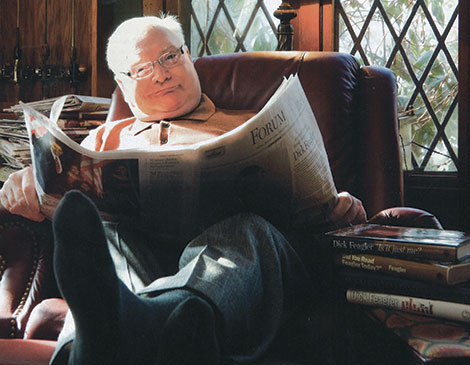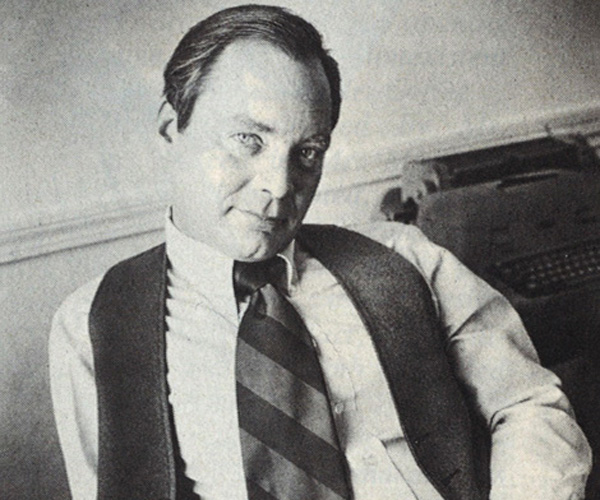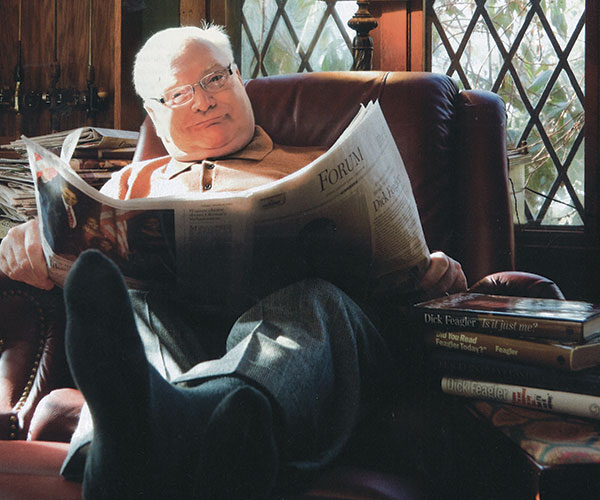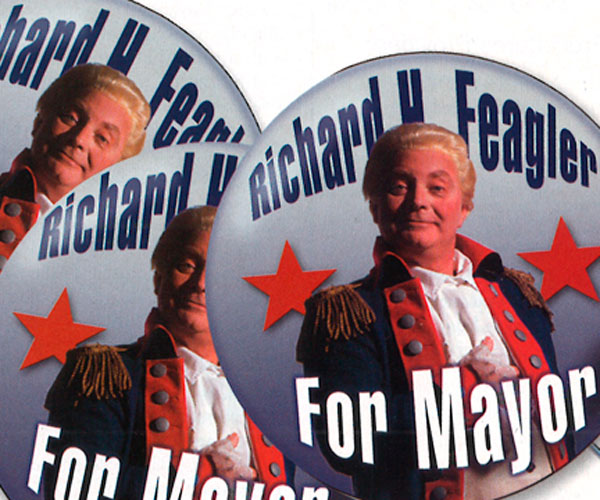I won’t even try to compete.
Not when Dick Feagler, our city’s newsprint compass, appears in our pages, talking with longtime Cleveland Magazine editor Mike Roberts about his career and the city he covered, chided and changed.
Playing against them is more lopsided than Browns vs. Steelers. So I’m conceding.
And guess who wins? You do.
Often overlooked in Feagler’s 38 years as a columnist is his time as a senior editor at Cleveland Magazine. It was 1979. Dennis Kucinich was mayor and the city had just defaulted. Life was good — but only if you were a columnist looking for material.
It’s amazing (but not surprising) how well those 1979 columns stand up to today’s issues — and what a good primer Feagler’s pieces are for how to last four decades as a writer. (See page 84 for more how-tos).
Not when Dick Feagler, our city’s newsprint compass, appears in our pages, talking with longtime Cleveland Magazine editor Mike Roberts about his career and the city he covered, chided and changed.
Playing against them is more lopsided than Browns vs. Steelers. So I’m conceding.
And guess who wins? You do.
Often overlooked in Feagler’s 38 years as a columnist is his time as a senior editor at Cleveland Magazine. It was 1979. Dennis Kucinich was mayor and the city had just defaulted. Life was good — but only if you were a columnist looking for material.
It’s amazing (but not surprising) how well those 1979 columns stand up to today’s issues — and what a good primer Feagler’s pieces are for how to last four decades as a writer. (See page 84 for more how-tos).
Determine who’s paying the bill. From Feagler’s first Cleveland Magazine column, on why newspapers and magazines don’t write more “good news” stories: “I don’t rush blindly into any assignment. I weigh the considerations first. ‘Who is paying for lunch?’ I asked. ‘I am,’ said Mr. Roberts. ‘Can I have the Number Four with the Hollandaise sauce on it?’ I asked. ‘You may,’ said Mr. Roberts. ‘OK,’ I said. ‘I’ll write it.’ ”
Know thyself. On his new office in the Keith Building and his new approach to writing: “It would be nice, I think, if I could change my act to match the décor. But I know better. Life is not like that. You are what you are and you go where life takes you. And if you change at all, you change so gradually that the change is hard to see and you are the last to see it.”
Know thy city. In a column lamenting that the Terminal Tower observation deck remained closed, three years after a gunman terrorized the Chessie System offices on the building’s upper floors: “The Terminal Tower remains a symbol still. What it symbolizes now is urban despair. The feeling that no solution can be found for certain kinds of problems. That we have become a city afraid of dark corners and people on elevators. A city of locks and cynicism. Of distrust and paranoia.”
Look at things in a new way. Responding to critics who said he was too soft on Mayor Dennis Kucinich: “I began re-evaluating my position. ... Perhaps I was suffering from a deficiency of hatred.”
Demand more. “Perhaps the thing I most disapprove of in Dennis Kucinich is that he lacks a vision of the way things should be. An idealistic vision. Unlike Martin Luther King, he has, so far as I can determine, no dream. Dreams, perhaps, but no dream. And the disturbing thing is that he is able to function — to succeed — without one.”
Question prevailing thought. On a new cable TV system in Columbus, dubbed the QUBE, that allowed instant viewer feedback to programming such as an American Idol-style talent show or a presidential address: “Suppose, though, that an overwhelming number of people were hooked up to a QUBE rating system and could instantly rate a presidential performance. ... I’m afraid he would go after ratings. ... I am afraid that very soon, we would judge our presidents almost solely not on what they do but how they play. I’m afraid we are doing that already, and I’m afraid that nobody seems very afraid of that.”
Know thyself. On his new office in the Keith Building and his new approach to writing: “It would be nice, I think, if I could change my act to match the décor. But I know better. Life is not like that. You are what you are and you go where life takes you. And if you change at all, you change so gradually that the change is hard to see and you are the last to see it.”
Know thy city. In a column lamenting that the Terminal Tower observation deck remained closed, three years after a gunman terrorized the Chessie System offices on the building’s upper floors: “The Terminal Tower remains a symbol still. What it symbolizes now is urban despair. The feeling that no solution can be found for certain kinds of problems. That we have become a city afraid of dark corners and people on elevators. A city of locks and cynicism. Of distrust and paranoia.”
Look at things in a new way. Responding to critics who said he was too soft on Mayor Dennis Kucinich: “I began re-evaluating my position. ... Perhaps I was suffering from a deficiency of hatred.”
Demand more. “Perhaps the thing I most disapprove of in Dennis Kucinich is that he lacks a vision of the way things should be. An idealistic vision. Unlike Martin Luther King, he has, so far as I can determine, no dream. Dreams, perhaps, but no dream. And the disturbing thing is that he is able to function — to succeed — without one.”
Question prevailing thought. On a new cable TV system in Columbus, dubbed the QUBE, that allowed instant viewer feedback to programming such as an American Idol-style talent show or a presidential address: “Suppose, though, that an overwhelming number of people were hooked up to a QUBE rating system and could instantly rate a presidential performance. ... I’m afraid he would go after ratings. ... I am afraid that very soon, we would judge our presidents almost solely not on what they do but how they play. I’m afraid we are doing that already, and I’m afraid that nobody seems very afraid of that.”
Invoke the masters. “If I were Hemingway, and who wants to be, I would say that there is a smell of death hanging around this mayoral election. Not physical death. Nothing that sensational. Spiritual death is more like it. Dull death.”
Stick up for values. “My Army was a haven for newlyweds. ... We believed in suburbs, domesticity and Chevrolets. Our wives received Betty Crocker Cookbooks as wedding presents and Revereware pots and other symbols of anti-feminism. We were a generation cozy in our bland society. ... We didn’t think there was anything wrong with it. A lot of us still don’t.”
Stick up for values. “My Army was a haven for newlyweds. ... We believed in suburbs, domesticity and Chevrolets. Our wives received Betty Crocker Cookbooks as wedding presents and Revereware pots and other symbols of anti-feminism. We were a generation cozy in our bland society. ... We didn’t think there was anything wrong with it. A lot of us still don’t.”
To read all of Dick Feagler’s 1979 Cleveland Magazine columns, visit clevelandmagazine.com/feagler.




